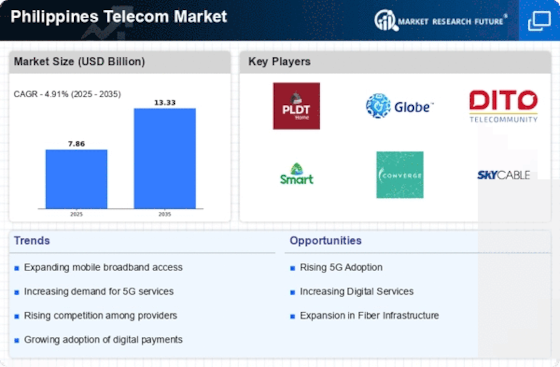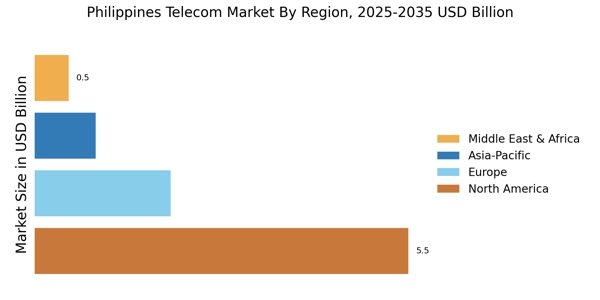Adoption of 5G Technology
The introduction of 5G technology represents a transformative phase for the Philippines Telecom Market. As of October 2025, several telecom operators have commenced the rollout of 5G networks, promising significantly faster data speeds and lower latency. This technological advancement is expected to facilitate the development of innovative applications, such as smart cities and the Internet of Things (IoT). The potential for 5G to enhance mobile broadband services could attract new users and increase overall market penetration. Furthermore, the adoption of 5G may stimulate investments in related sectors, thereby contributing to the broader economic landscape of the Philippines Telecom Market.
Rising Demand for Mobile Connectivity
The Philippines Telecom Market experiences a notable surge in demand for mobile connectivity, driven by the increasing reliance on smartphones and mobile applications. As of October 2025, mobile subscriptions in the Philippines reach approximately 150 million, indicating a penetration rate of around 135%. This high penetration suggests that many individuals possess multiple mobile connections, reflecting a growing trend towards mobile-first communication. The demand for mobile data services continues to escalate, with average data consumption per user rising significantly. This trend compels telecom providers to enhance their infrastructure and service offerings, thereby fostering competition and innovation within the Philippines Telecom Market.
Growth of E-commerce and Digital Services
The Philippines Telecom Market is witnessing a robust growth in e-commerce and digital services, driven by changing consumer behaviors and preferences. As of October 2025, the e-commerce sector in the Philippines is projected to reach a valuation of over USD 20 billion, indicating a substantial increase in online transactions. This growth is closely linked to the rising internet penetration and mobile data usage, which facilitate seamless online shopping experiences. Telecom providers are increasingly partnering with e-commerce platforms to offer bundled services, enhancing customer engagement and satisfaction. This trend underscores the interdependence between telecommunications and digital commerce within the Philippines Telecom Market.
Government Initiatives and Regulatory Support
The Philippines Telecom Market benefits from proactive government initiatives aimed at improving telecommunications infrastructure and services. The government has implemented policies to encourage foreign investment and competition, which may lead to enhanced service quality and reduced prices for consumers. Recent regulatory measures focus on streamlining the approval process for new telecommunications projects, thereby expediting the rollout of essential services. Additionally, the National Telecommunications Commission (NTC) actively monitors service quality and compliance, ensuring that telecom operators adhere to established standards. These supportive measures create a conducive environment for growth and development within the Philippines Telecom Market.
Increased Investment in Infrastructure Development
The Philippines Telecom Market is characterized by a significant increase in investment aimed at infrastructure development. Telecom operators are allocating substantial resources to expand their network capabilities, particularly in underserved and rural areas. As of October 2025, investments in telecommunications infrastructure are projected to exceed USD 3 billion, reflecting a commitment to improving service accessibility and quality. This influx of capital is likely to enhance the overall competitiveness of the market, as operators strive to meet the growing demand for reliable connectivity. The focus on infrastructure development not only benefits consumers but also supports economic growth and digital transformation within the Philippines Telecom Market.

















